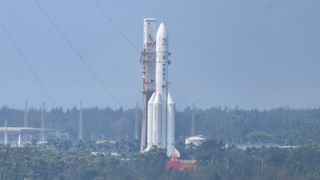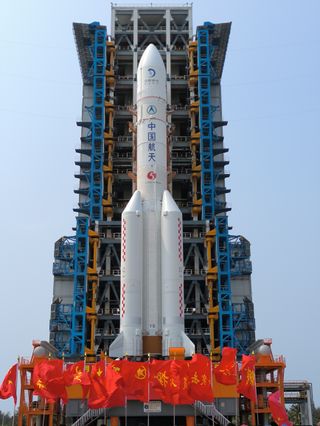Watch live: China launching Chang'e 6 mission to far side of the moon early May 3 (video)
Liftoff is expected to occur between 5:17 a.m. and 6:18 a.m. ET on Friday (May 3).
China is set to launch its next robotic moon mission on Friday (May 3), and you can watch the action live.
A Long March 5 rocket carrying the Chang'e 6 lunar far side sample return mission is scheduled to launch between 5:17 a.m. EDT (0917 GMT) and 6:18 a.m. EDT (1018 GMT) on Friday. The mission will take off from China's Wenchang Satellite Launch Center on the tropical island province of Hainan, off the southeastern coast of mainland China.
You can watch the action live here when the time comes, courtesy of CCTV+. The live webcast will begin at 4:30 a.m. ET (0830 GMT) on May 3.
Related: China to launch sample-return mission to the moon's far side on May 3

Chang'e 6 will involve four different pieces of hardware during its 53-day mission: a lunar orbiter, a moon lander, an ascender spacecraft and a reentry module. First, the lunar orbiter will reach and enter lunar orbit. From there, it will send down the lander and ascender.
The robotic lander will aim for a large impact crater on the far side of the moon known as Apollo basin, where it will attempt to collect up to 4.4 pounds (2 kilograms) of lunar material.
After the samples are collected, they will be transferred to the ascent vehicle, which will then launch them back up to the orbiter. After the samples dock with the orbiter, the spacecraft will then begin its journey back toward Earth.
Get the Space.com Newsletter
Breaking space news, the latest updates on rocket launches, skywatching events and more!
Finally, the orbiter will release the samples toward Earth inside the reentry module. If successfully returned and collected, the samples will provide Earth's first glimpse at pristine moon material from the lunar far side and will help answer questions about both the early impact history of the solar system and the geological evolution of the moon.

Chinese space agency leadership is already praising the level of complexity in the mission.
"Chang'e 6 aims to achieve breakthroughs in the design and control technology of the moon's retrograde orbit, intelligent sampling, takeoff and ascent technologies, and automatic sample-return on the far side of the moon," Ge Ping, deputy director of the Center of Lunar Exploration and Space Engineering for the China National Space Administration, told China Central Television (CCTV).
To aid the Chang'e 6 mission, China launched the Queqiao-2 satellite in March 2024 to serve as a communications relay for the spacecraft visiting the lunar far side. Along for the ride were two other experimental satellites that will serve as communication and navigation relays for future lunar endeavors. The two have already beamed haunting lunar imagery back to Earth.
Join our Space Forums to keep talking space on the latest missions, night sky and more! And if you have a news tip, correction or comment, let us know at: community@space.com.

Brett is curious about emerging aerospace technologies, alternative launch concepts, military space developments and uncrewed aircraft systems. Brett's work has appeared on Scientific American, The War Zone, Popular Science, the History Channel, Science Discovery and more. Brett has English degrees from Clemson University and the University of North Carolina at Charlotte. In his free time, Brett enjoys skywatching throughout the dark skies of the Appalachian mountains.
